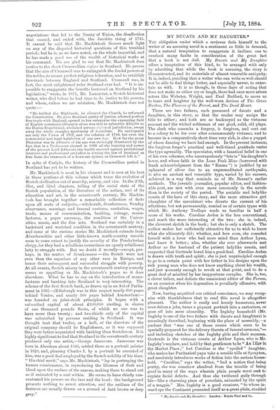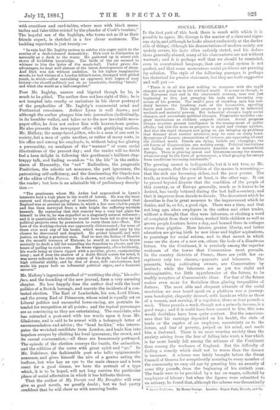MY DUCATS AND MY DAUGHTER.* Tut obligation under which a
reviewer feels himself to the writer of an amusing novel is a sentiment so little in demand, that a natural temptation to exaggerate it inclines one to overlook many faults in consideration of the great fact that a book is not dull. My Ducats and My Daughter offers a temptation of this kind, to be arranged with only by admitting that while the book is amusing, the story is ill-constructed, and its materials of almost venerable antiquity. It is, indeed, puzzling that a writer who can write so well should not be able to find things better, and especially newer, to enter- tain us with. It is as though, in these days of acting that does not make us either cry or laugh, there had once more arisen actors like Webster, Wright, and Paul Bedford, to move us to tears and laughter by the well-worn devices of The Green Bushes, The Flowers of the Forest, and The Dead Heart.
There are two fathers, each possessed of ducats and a daughter, in this story, so that the reader may assign the title to either ; and both are as hackneyed as the virtuous peasant and the wicked nobleman of our gbod, solid, old plays. The clerk who commits a forgery, is forgiven, and sent out to a colony to be for ever after consummately virtuous, and to become in a comparatively short time very rich, is also a puppet of whose dancing we have had enough. In the present instance, the forgiven forger's practical and well-timed gratitude varies the type agreeably. The speculator, with a fanatical belief in one of his own schemes, who unscrupulously "lets in" his daughter's lover, and whose faith in the Lone Peak Mine (borrowed with frank acknowledgment from the " Emma ") is justified by an upheaval of silver due to an unpremeditated earthquake, is also an ancient and venerable type, varied by his success, achieved in a way that reminds us of Mr. Besant's earlier methods. The juvenile journalist, popular editor, and fashion- able poet, are met with even more commonly in the novels than in the society of the period. The amiable and ladylike cousin of the hero of this story, and the more attractive girl (daughter of the speculator) who diverts the current of his affections, but not permanently, remind us of certain types with which Mr. Anthony Trollope made us familiar in half a score of his works. Caroline Arden is the less conventional, and much the more interesting of the two : she is, indeed, the cleverest sketch in the book ; but she is only a sketch. The author makes her sufficiently attractive for us to wish to know what she ultimately did ; whether, and how soon, she consoled herself with a lover who had more mind than Arthur Lynn, and knew it better ; also, whether she ever afterwards met Arthur as the husband of the patient ladylike cousin, and suspected that Gertrude bored him a good deal. Caroline Arden is drawn with truth and spirit ; she is just unprincipled enough to go to a certain point with her father in his designs upon the rich young man who does not know anything about his wealth, and just womanly enough to revolt at that point, and to do a great deal of mischief by her inopportune scruples. She is, too, a clever talker, and defeats the omniscient editor of the Forum, on an occasion when his dogmatism is peculiarly offensive, with great slaughter.
Now, having acquitted our critical conscience, we may recog- nise with thankfulness that to read this novel is altogether pleasant. The author is easily and keenly humorous, never over-drives a joke, turns a piquant portrait into a caricature, or goes off into mere absurdity. The Ingleby household (Mr. Ingleby is one of the two fathers with ducats and daughters) is amusingly described, beginning with the place of assembly,—a parlour that " was one of those rooms which seem to be specially prepared for the delivery therein of funeral sermons,"— and including sketches of the Ingleby girls and their mamma. Gertrude is the virtuous cousin of Arthur Lynn, who is Mr. Ingleby's nephew, and held by that gentlemen to be " An Idler in the Market Place ;" but Caroline is the " spoiled " daughter, who makes her Puritanical papa take a seaside villa at Sprayton, and resolutely introduces works of fiction into the serious house- hold. " Caroline," says the writer, " had a notion that being pretty, she was somehow absolved from the trouble of being good in many of the ways wherein plain people must seek to expiate facial defects. And thus she twittered gaily through life—like a charming piece of porcelain, animated by the spirit of a magpie." Mrs. Ingleby is a good creature, " to whose in- ward eye the Continent presented itself as a great plain, studded • Mg Ducats and My Daughter. London: Began Paul an CO. with crucifixes and card-tables, where men with black mous- taches and false titles existed by the plunder of Cook's tourists." The hopeful son of the Inglebys, who turns out as ill as their friends expect, is sketched in a few clever sentences. The budding reprobate is just twenty:— "In vain had Mr. Ingleby striven to subdue this eager spirit to the routine of a drab-coloured domesticity. Dick took to dissipation as naturally as a duck to the water. He gathered up in secret rich stores of forbidden knowledge. The birds of the air seemed to whisper to him the lyrics of the music-hall. Under grave dis- advantages, he kept well abreast of the latest developments of slang. And Dick was not without ambition. In his higher imaginative moods, he had visions of a London billiard-room, thronged with gilded youth, in which—after tantalising an opponent with hopes of easy victory—he should suddenly put on an inimitable, dazzling ' break,' and witch the world as a ball-compeller."
Poor Mr. Ingleby, narrow and bigoted though he be, is much to be pitied. The author does not lose sight of this ; he is not tempted into cruelty or caricature in his clever portrayal of the perplexities of Mr. Ingleby's commercial mind and Puritanical conscience. Arthur Lynn is well drawn ; and although the author plunges him into journalism (individually, in its humbler walks), and takes us to the now inevitable news- paper office, he does not endow him with heaven-born genius. He also presents the newspaper office with gratifying realism. Mr. Mallory, the many-faced editor, who is a man of one sort in society, but a man of quite another, or rather of many sorts, in his office and among his employes, is, without being too glaring a personality, an amalgam of the " manner " of some social illustrations of the present day ; and the reader will no doubt feel a keen delight in following this gentleman's brilliant clap- trappy talk, and finding so-and-so " to the life" in the enthu- siasm of Humanity, the " red " Radicalism, the pragmatic Positivism, the eclectic art nonsense, the pert ignorance, the patronising self-sufficiency, and the domineering Sir Oracle-ism
of the editor of the Forum. He is shown, not only described, to the reader; but here is an admirable bit of preliminary descrip-
tion :—
" The gentleman whom Mr. Arden had approached in Lynn's interests held a high place in the world of letters. He was the most earnest and thorough-going of iconoclasts. He maintained that England was at present an inferno, in which a few men clad in purple and fine linen surveyed from a safe height the suffering myriads beneath. By repeating that this country was a very bad place for himself to live in, he was regarded as a singularly earnest reformer ; and it is questionable whether he would have been led to give up his political projects even by permission to carry them into effect. His love of the working-classes was apparently-disinterested; for none of them ever read any of his books, which were studied only by the classes he denounced and despised. He prided himself, and with justice, on being a practical man. Had he met the father of Hamlet on the moonlit terraces of Elsinore, he would at once have begun mentally to draft a bill for extending the franchise to ghosts, and the hours of polling to cock-crow. He wrote vigorously, often brilliantly, his words being at times tipped with a peculiar, grave, exasperating irony ; and if ever the shadow of a doubt flitted across his mind, it was never reflected in the clear mirror of his style. He had shown high editorial ability, and by dint of sheer, deft crochetiness, bad made his paper both an influential political organ, and a financial
success."
Mr. Mallory's ingenious method of " scuttling the ship," his voile- face, and the founding of the new journal, form a very amusing chapter. No less happily does the author deal with the local politics of a Scotch borough, and narrate the incidents of a con- tested election. The Earl of Leaderdale, his son, Lord Elvan, and the young Earl of Primavere, whose mind is equally set on Liberal politics and successful horse-racing, are portraits in- tended for recognition at all points ; and the topical personages are as convincing as they are entertaining. The candidate, who has extracted a post-card with ten words upon it from Mr. Gladstone, and is said to be armed with a holograph letter of recommendation and advice ; the "head heckler," who interro- gates the wretched candidate from London, and leads him into hopeless scrapes by eliciting his local ignorance; the crowd, and its casual conversation,—all these are humorously portrayed. The episode of the election conveys the bustle, the animation, and the oddities of the scene with great spirit and "go." In Mr. Dulcimer, the fashionable poet who talks epigrammatic nonsense, and gives himself the airs of a genius acting the buffoon, but who has an eye to the main chance and a keen soent for a good dinner, we have the portrait of a type which, it is to be hoped, will not long survive the particular phase of social affectation in which it has hitherto thriven. That the author of My Ducats and My Daughter will ever give us good novels, we greatly doubt ; but we feel pretty confident that he will cheer us with amusing books.

































 Previous page
Previous page